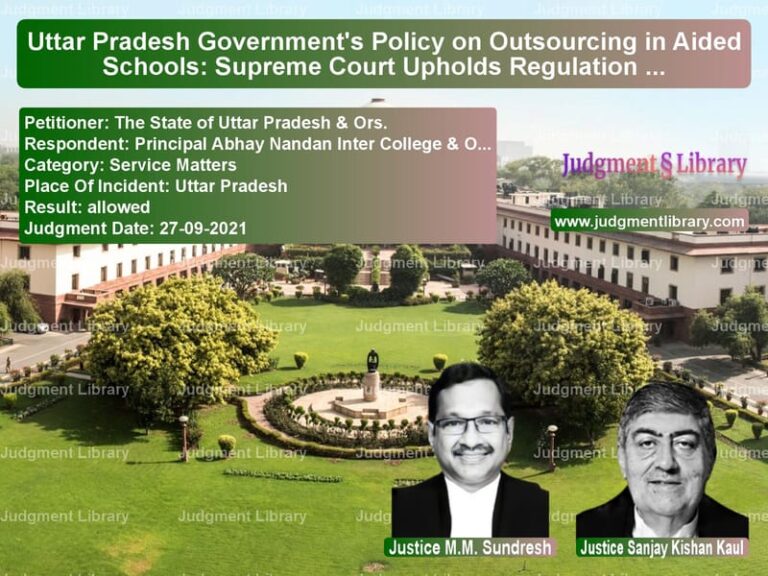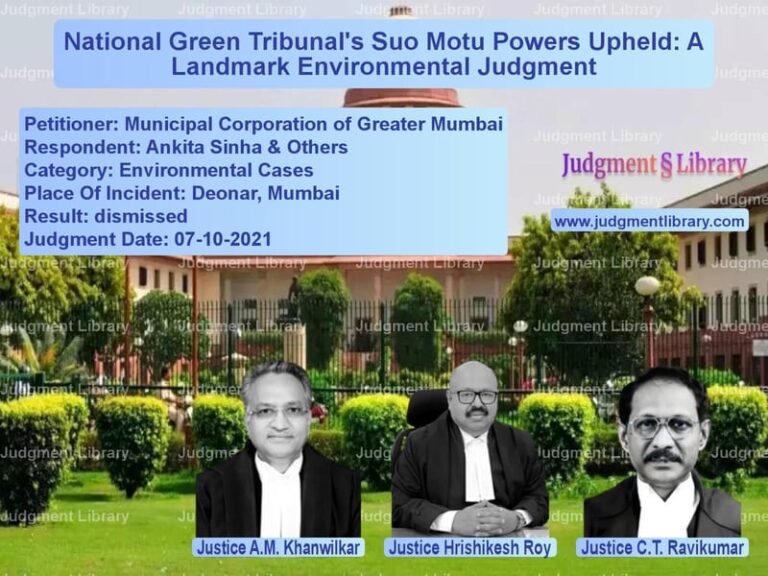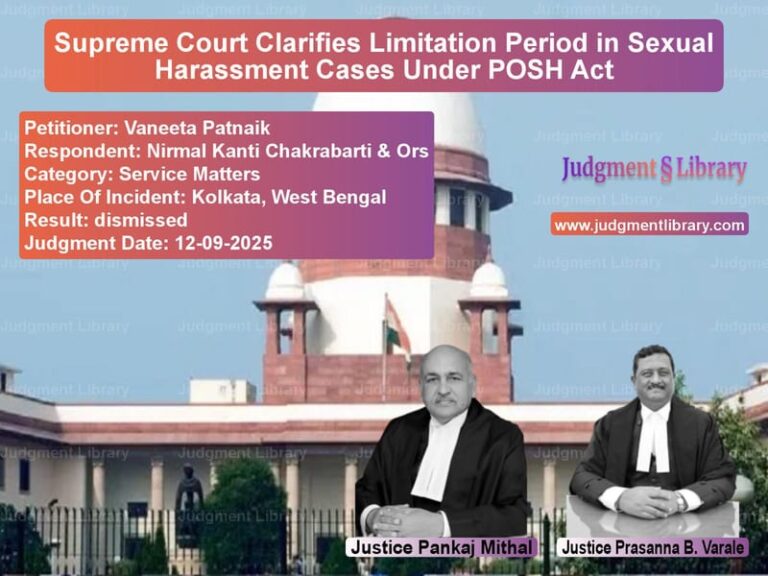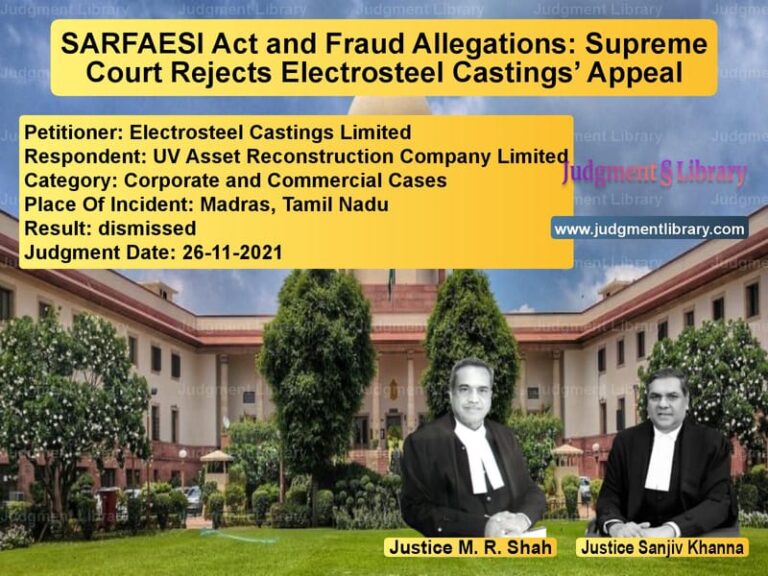Eviction Case Reinstated: Supreme Court Overturns Delhi High Court Ruling on Tenant Dispute
The Supreme Court of India recently ruled in favor of the eviction of tenants in the case Kusum Lata Sharma vs. Arvind Singh. The ruling overturned a Delhi High Court decision that had dismissed eviction orders against tenants, stating that the landlord had not been forthright about property details. The Supreme Court reaffirmed that a landlord’s bona fide requirement is a legally valid ground for eviction under the Delhi Rent Control Act, 1958.
Background of the Case
The case arose from eviction petitions filed by Kusum Lata Sharma against tenants occupying rooms on the first and second floors of her property in Majlis Park, Delhi. The petitions were filed under Section 14(1)(e) of the Delhi Rent Control Act, 1958, which allows eviction if the premises are required for bona fide residential purposes.
The Rent Controller initially ruled in favor of the landlord, granting eviction orders in November 2014. However, the tenants challenged the orders before the Delhi High Court, which set aside the eviction orders on April 17, 2018. The High Court held that the landlord had misrepresented the property details, leading to a misleading petition.
Dissatisfied with this decision, Kusum Lata Sharma appealed to the Supreme Court.
Key Legal Issues
The Supreme Court considered the following issues:
- Did the landlord genuinely require the premises for personal use?
- Was the High Court justified in dismissing the eviction order based on discrepancies in property description?
- Could the court interfere with factual findings of the Rent Controller?
Arguments by the Appellant (Landlord – Kusum Lata Sharma)
The landlord argued:
- Bona Fide Need: She required the property for herself and her extended family, including her brother-in-law, his wife, and their children.
- Limited Living Space: The landlord and her family lived in cramped conditions and required additional rooms.
- No Alternative Property: The claim that she owned additional properties was baseless.
- Property Misdescription Not Material: The alleged discrepancies in property details did not affect the core issue of her need for the premises.
Arguments by the Respondents (Tenants)
The tenants contended:
- Misleading Petition: The landlord misrepresented property ownership and boundaries.
- No Genuine Need: The eviction was sought for ulterior motives, possibly to sell the property for profit.
- Availability of Other Properties: The landlord’s brother-in-law and his family had alternative accommodations.
- Tenancy Protection: The landlord was trying to evict long-standing tenants without valid reasons.
Supreme Court’s Ruling
1. Landlord’s Bona Fide Requirement Is Established
The Supreme Court ruled that the landlord had sufficiently demonstrated her need for the premises. It observed:
“The landlord’s requirement of additional rooms for her family, including her brother-in-law’s children, is genuine. Courts must consider the realities of joint family living arrangements.”
2. High Court Overstepped Its Jurisdiction
The Supreme Court held that the High Court exceeded its limited powers under Section 25-B(8) of the Delhi Rent Control Act, which permits only a limited review of Rent Controller decisions. It stated:
“The High Court was not justified in interfering with findings of fact made by the Rent Controller, particularly when those findings were based on evidence.”
3. Minor Discrepancies in Property Description Not Grounds for Dismissal
The Court clarified that minor inconsistencies in describing the property do not invalidate a landlord’s legitimate need:
“The description of property, though imprecise in some aspects, does not undermine the bona fide requirement of the appellant.”
4. Eviction Order Restored
The Supreme Court reinstated the eviction orders passed by the Rent Controller, granting the tenants time until December 31, 2023 to vacate. The tenants were required to continue paying rent until they vacate.
Key Excerpt from the Judgment
In its final remarks, the Supreme Court stated:
“The findings on bona fide requirement of the appellant could not have been disturbed by the High Court on a rather nebulous ground of want of clarity about the identification of the property in question. Thus, the impugned orders deserve to be set aside, and the orders of eviction deserve to be restored.”
Conclusion
The Supreme Court’s decision in Kusum Lata Sharma vs. Arvind Singh reinforces the legal principle that minor inconsistencies in property descriptions cannot be used to deny a landlord’s legitimate request for eviction. The ruling ensures that tenants cannot exploit technicalities to indefinitely hold onto rented premises when a landlord genuinely needs them.
This judgment serves as a significant precedent in rental disputes, particularly in metropolitan areas like Delhi, where tenancy laws often lead to prolonged litigation. It upholds the rights of landlords while ensuring fair treatment of tenants.
Petitioner Name: Kusum Lata Sharma.Respondent Name: Arvind Singh.Judgment By: Justice Dinesh Maheshwari, Justice Sanjay Kumar.Place Of Incident: Majlis Park, Delhi.Judgment Date: 25-04-2023.
Don’t miss out on the full details! Download the complete judgment in PDF format below and gain valuable insights instantly!
Download Judgment: kusum-lata-sharma-vs-arvind-singh-supreme-court-of-india-judgment-dated-25-04-2023.pdf
Directly Download Judgment: Directly download this Judgment
See all petitions in Landlord-Tenant Disputes
See all petitions in Property Disputes
See all petitions in Damages and Compensation
See all petitions in Judgment by Dinesh Maheshwari
See all petitions in Judgment by Sanjay Kumar
See all petitions in allowed
See all petitions in Quashed
See all petitions in supreme court of India judgments April 2023
See all petitions in 2023 judgments
See all posts in Civil Cases Category
See all allowed petitions in Civil Cases Category
See all Dismissed petitions in Civil Cases Category
See all partially allowed petitions in Civil Cases Category







